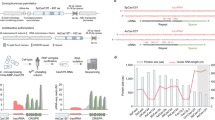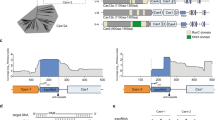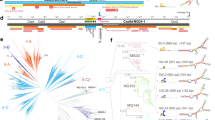Abstract
Cpf1 is a CRISPR effector protein that has greater specificity than Streptococcus pyogenes Cas9 (SpCas9) in genome-editing applications. Here we show that Lachnospiraceae bacterium (Lb) and Acidaminococus sp. (As) Cpf1 orthologs have RNase activities that can excise multiple CRISPR RNAs (crRNAs) from a single RNA polymerase II–driven RNA transcript expressed in mammalian cells. This property simplifies modification of multiple genomic targets and can be used to increase the efficiency of Cpf1-mediated editing.
This is a preview of subscription content, access via your institution
Access options
Access Nature and 54 other Nature Portfolio journals
Get Nature+, our best-value online-access subscription
$29.99 / 30 days
cancel any time
Subscribe to this journal
Receive 12 print issues and online access
$259.00 per year
only $21.58 per issue
Buy this article
- Purchase on Springer Link
- Instant access to full article PDF
Prices may be subject to local taxes which are calculated during checkout



Similar content being viewed by others
References
Zetsche, B. et al. Cell 163, 759–771 (2015).
Kim, D. et al. Nat. Biotechnol. 34, 863–868 (2016).
Kleinstiver, B.P. et al. Nat. Biotechnol. 34, 869–874 (2016).
Mohanraju, P. et al. Science 353, aad5147 (2016).
Fonfara, I., Richter, H., Bratovič, M., Le Rhun, A. & Charpentier, E. Nature 532, 517–521 (2016).
Dong, D. et al. Nature 532, 522–526 (2016).
Yamano, T. et al. Cell 165, 949–962 (2016).
Certo, M.T. et al. Nat. Methods 8, 671–676 (2011).
Orioli, A. et al. Nucleic Acids Res. 39, 5499–5512 (2011).
Shcherbakova, D.M. & Verkhusha, V.V. Nat. Methods 10, 751–754 (2013).
Pédelacq, J.D., Cabantous, S., Tran, T., Terwilliger, T.C. & Waldo, G.S. Nat. Biotechnol. 24, 79–88 (2006).
Zetsche, B. et al. Nat. Biotechnol. 35, 31–34 (2017).
Samulski, R.J. & Muzyczka, N. Annu. Rev. Virol. 1, 427–451 (2014).
Guschin, D.Y. et al. Methods Mol. Biol. 649, 247–256 (2010).
Acknowledgements
This work is supported by NIH R37 AI091476 and P01 AI100263 (M.F.).
Author information
Authors and Affiliations
Contributions
G.Z. conceived this study and developed it with assistance from M.F.; G.Z., H.W., Y.L., and M.H.T. performed all experiments; M.F. and G.Z. wrote the manuscript.
Corresponding author
Ethics declarations
Competing interests
The authors declare no competing financial interests.
Supplementary information
Supplementary Text and Figures
Supplementary Results, Supplementary Tables 1–4 and Supplementary Figures 1–6 (PDF 8474 kb)
Rights and permissions
About this article
Cite this article
Zhong, G., Wang, H., Li, Y. et al. Cpf1 proteins excise CRISPR RNAs from mRNA transcripts in mammalian cells. Nat Chem Biol 13, 839–841 (2017). https://doi.org/10.1038/nchembio.2410
Received:
Accepted:
Published:
Issue Date:
DOI: https://doi.org/10.1038/nchembio.2410
This article is cited by
-
Programmable mammalian translational modulators by CRISPR-associated proteins
Nature Communications (2023)
-
Multiplex base- and prime-editing with drive-and-process CRISPR arrays
Nature Communications (2022)
-
Biochemical characterization of the two novel mgCas12a proteins from the human gut metagenome
Scientific Reports (2022)
-
Multiplexed base editing through Cas12a variant-mediated cytosine and adenine base editors
Communications Biology (2022)
-
Scalable biological signal recording in mammalian cells using Cas12a base editors
Nature Chemical Biology (2022)



